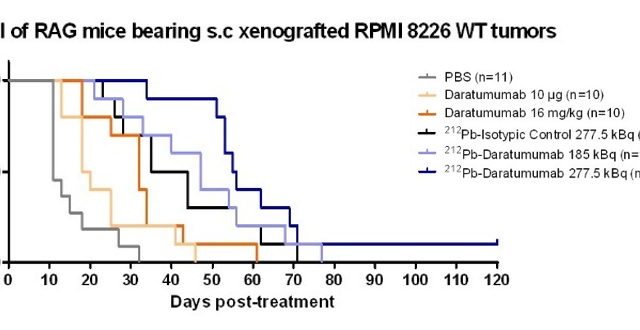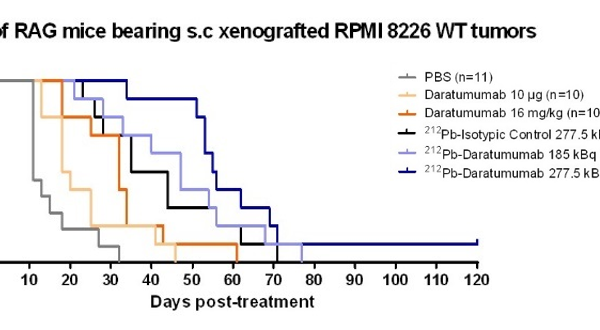
212Pb Alpha‐Radioimmunotherapy targeting CD38 in Multiple Myeloma: a preclinical study
212Pb Alpha-Radioimmunotherapy targeting CD38 in Multiple Myeloma: a preclinical study.
Abstract
Multiple myeloma (MM) is a plasma cell cancer and represents the second most frequent hematological malignancy. Despite new treatments and protocols including high doses chemotherapy associated with autologous stem cell transplantation, the prognosis of MM patients is still poor. Alpha-radioimmunotherapy (alpha-RIT) represents an attractive treatment strategy due to the high linear energy transfer and short path length of alpha-radiation in tissues, resulting in high tumor cell killing and low toxicity to surrounding tissues. In this study, we investigated the potential of alpha-RIT with 212Pb-Daratumumab (anti-CD38), in both in vitro and in vivo models, as well as an anti-mouse CD38 antibody using in vivo models. Methods: Inhibition of cell proliferation after incubation of RPMI8226 cell line with increasing activities (0.185-3.7 kBq/ml) of 212Pb-isotypic control or 212Pb-Daratumumab was evaluated. Biodistribution was performed in vivo by SPECT-CT imaging and post-mortem. Dose range finding (DRF) and acute toxicity studies were conducted. As Daratumumab does not bind the murine CD38, biodistribution and DRF were also determined using an anti-murine CD38 antibody. To evaluate in vivo efficacy of 212Pb-Daratumumab, mice were engrafted subcutaneously with 5.106 RPMI8226 cells. Mice were treated 13 days post-engraftment with an intravenous injection of 212Pb-Daratumumab or control solutions. Therapeutic efficacy was monitored by tumor volume measurements and overall survival. Results: Significant inhibition of proliferation of the human myeloma RPMI8226 cell line was observed after three days of incubation with 212Pb-Daratumumab compared to 212Pb-Isotypic Control or cold antibodies. Biodistribution studies showed a specific tumoral accumulation of Daratumumab. No toxicity was observed with 212Pb-Daratumumab up to 370 kBq due to the lack of cross-reactivity. Nevertheless, acute toxicity experiments with 212Pb-anti-mCD38 established a toxic activity of 277.5 kBq. To remain within realistically safe treatment activities for efficacy studies, mice were treated with 185 kBq or 277.5 kBq of 212Pb-Daratumumab. Marked tumor growth inhibition compared to controls was observed, with a median survival of 55 days for 277.5 kBq of 212Pb-Daratumumab instead of 11 for PBS control groups. Conclusion: These results showed 212Pb-Daratumumab efficacy on xenografted mice with significant tumor regression and increased survival. This study highlights alpha-RIT potency in MM treatment.
Copyright © 2019 by the Society of Nuclear Medicine and Molecular Imaging, Inc.
KEYWORDS:
212Pb; Alpha-radioimmunotherapy; CD38; Hematology; Multiple Myeloma; Radioimmunoimaging; Radionuclide Therapy

